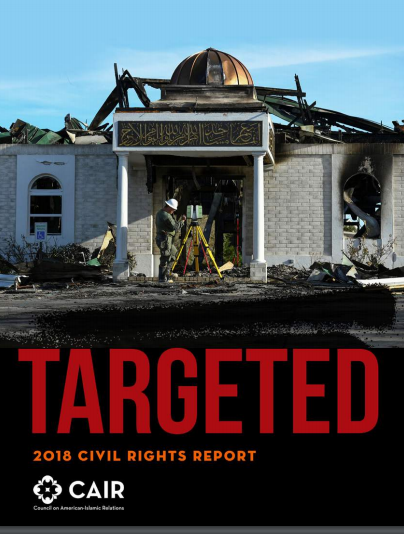 |
| CAIR’s 2018 civil rights report (image via CAIR) |
The Council on American-Islamic Relations (CAIR), the nation's largest Muslim civil rights and advocacy organization, today released a one-of-its-kind report offering data on the impact and legal pushback against anti-Muslim bias across the United States in the past year.
- Video: CAIR News Conference to Release 2018 Civil Rights Report
- CAIR 2018 Civil Rights Report: Targeted
- Video: CAIR's 2018 Civil Rights Report Offers Data on Impact of Growing Anti-Muslim Bias
"Not only have anti-Muslim bias incidents continued to increase, but a greater percentage of these instances have been violent in nature, targeting American children, youth and families who are Muslim or perceived to be Muslim," said CAIR National Executive Director Nihad Awad.
"CAIR's 2018 Civil Rights Report provides concrete evidence that the unconstitutional Muslim Ban resulted in more Islamophobic hate and violence," said CAIR Research and Advocacy Coordinator Zainab Arain, author of the report. "The anti-Muslim hate incidents documented in CAIR's report are an indictment of the Trump administration and its unconstitutional and divisive policies."
The most frequent types of incidents documented by CAIR in 2017 involved:
- Harassment, a non-violent or non-threatening incident of bias, at 14 percent of cases.
- Incidents in which the complainant was inappropriately targeted by U.S. Customs and Border Protection (CBP), accounting for 13 percent of cases.
- Hate crimes, including physical violence targeting individuals and damage targeting property, making up 12 percent.
- Cases in which the FBI harassed or otherwise inappropriately targeted the complainant, constituting 10 percent.
- Employment discrimination — including denial of work, being passed over for promotion, or harassment by a supervisor or other senior staff — accounting for 9 percent.
The most prevalent triggering factor of an anti-Muslim bias incident in 2017 was the victim's ethnicity or national origin, accounting for 32 percent of the total. The second most frequent trigger was the perpetrator's perception of an individual as a Muslim – irrespective of the presence or not of an identifying marker such as attire. This trigger constituted 14 percent of the total cases. A head scarf on a woman was the trigger in 13 percent of incidents. The Muslim Ban executive orders made up the fourth most frequent trigger, at 10 percent.
The report dataset is drawn primarily from the intakes CAIR conducts each year. With each case, CAIR's civil rights and legal staff seek to ensure the highest possible level of accuracy.
CAIR said it has witnessed an unprecedented spike in bigotry targeting American Muslims and members of other minority groups since the election of Donald Trump as president and his appointment of Islamophobic advisers and cabinet members.
- CAIR: John Bolton Chaired Anti-Muslim Think Tank (NBC)
- Video: CAIR, Muslim, Arab-American, Asian-American, Anti-Torture Groups to Urge Rejection of Pompeo's Confirmation as Secretary of State
⏩ CAIR launched an app to share critical "know your rights" information and to simplify the process to report hate crimes and bias incidents. CAIR is urging American Muslims and members of other minority groups to download the app and utilize this resource to stay informed and empowered.
⏩ For a quick download of CAIR's civil rights app, click here ⏪
 |
| “No Ban No Wall. Sanctuary for All.” (image via CAIR) |
About CAIR:
CAIR is America's largest Muslim civil liberties and advocacy organization. Its mission is to enhance understanding of Islam, protect civil rights, promote justice, and empower American Muslims.
La misión de CAIR es proteger las libertades civiles, mejorar la comprensión del Islam, promover la justicia, y empoderar a los musulmanes en los Estados Unidos.
Related Stories:

















